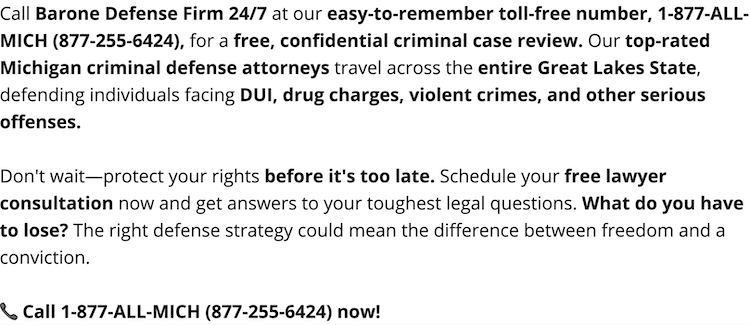Kent County Theft Lawyer
Laws regarding theft in Kent County are becoming increasingly complicated because technology has expanded the possibilities for criminal offenses, many of which are commonly referred to as theft.
In addition to retail theft, also known as shoplifting or retail fraud, there are separate laws governing identity theft, petty theft, felony theft, and credit card fraud, as well crimes such as robbery and burglary.
Michigan lawmakers increased the penalties for these offenses in recent years, so a criminal charge involving theft needs to be taken seriously. A Kent County theft lawyer who is familiar with the different laws and how courts have applied them to different circumstances will be able to provide the optimum defense for those charged with theft. Get in touch with an experienced defense attorney right away.
Theft Defined Under Michigan LawIn Michigan statutes, the basic crime of theft is referred to as “larceny.” Section 750.356 of the Michigan criminal code defines larceny as “stealing” property from another, which generally means taking something that belongs to another without permission and with the intent to deprive the owner of that property either permanently or temporarily.
The types of property which may be the subject of larceny that Kent County theft attorneys often see include:
- Money
- Goods
- Bank notes and other financial instruments
- Account books
- Deeds
- Receipts
- Public records
- Scrap metal
The crime of larceny is punished more severely if the property is of greater value or the individual involved has previously been convicted of a similar offense.
If the property allegedly stolen is worth less than $200, the crime is considered a misdemeanor punishable by up to three months imprisonment and a fine of up to $500 or three times the value of the property. However, if the individual has committed or attempted to commit a similar crime in the past, the punishment increases to up to one year in jail and a fine of up to $2,000, which is the same maximum punishment for a first offense where the property is valued between $200 and $1,000.
When the property at issue is worth more than $1,000 or the individual involved has a prior conviction for larceny of property worth more than $200, the crime becomes a felony. The maximum punishment can be as much as ten years imprisonment and a fine of up to $15,000 or three times the value of the stolen property.
Special Rules for Motor VehiclesLawmakers have enacted a special statute governing theft from motor vehicles and trailers. Stealing any “wheel, tire, air bag, catalytic converter, radio, stereo, clock, telephone, computer, or another electronic device” from one of these vehicles is considered a felony, regardless of the value of the item.
Moreover, if something else is stolen from the vehicle which is worth less than $1,000, the offense will be considered a felony if the vehicle is damaged in the process.
Finally, if it is found that the separate thefts from vehicles were committed “pursuant to a scheme or course of conduct” within a one year period, the value of the property stolen in those separate incidents can be combined to increase the maximum applicable penalty.
Contact a Kent County Theft Attorney TodayEven the theft of property with a small dollar value can become a major crime, and the consequences can be devastating. If you have been charged with a crime involving larceny, retail fraud, stolen property or a similar offense, you need a Kent County theft lawyer who understands the laws and knows how to build the best defense based on your circumstances. Skilled defense attorneys will fight for your rights and work tirelessly to achieve the best possible outcome. Call now.
 Barone Defense Firm Home
Barone Defense Firm Home




















